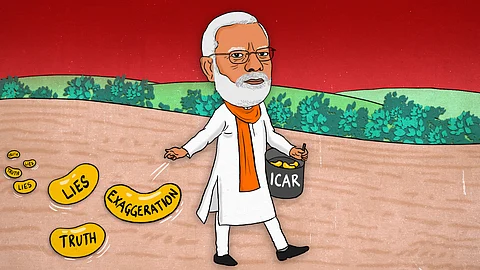

Gangavva Parameshwar Avaradi’s husband, Parameshwar Avaradi, sold the 3.5 acres of farmland he owned in Karnataka’s Dharwad district in 2019 to the BJP state government for a sum of Rs 50 lakh. “He still hasn’t received the full compensation,” Gangavva says, adding she’s never owned any land in her name, nor is she a farmer. But according to the Union government, Gangavva is one of the 75,000 farmers in the country whose income has doubled between 2016-17 and 2020-21 — specifically, the government has said that she owns 4.5 acres of farmland, and has made a profit of Rs 3,07,800 in the Financial Year 2020-21 — long after her husband’s land was sold.
This is one of the many discrepancies in a report published by the Indian Council of Agricultural Research (ICAR) — a Union government body — in June 2022. The report titled ‘Doubling Farmers Income’ profiles 75,000 farmers from across the country whose income has doubled in a period of five years, according to the report, because of the Union government’s Krishi Vigyan Kendra (KVK) Scheme.
How true are these claims? The News Minute hit the ground in the five southern states of Kerala, Tamil Nadu, Telangana, Andhra Pradesh, and Karnataka, as part of a TNM-Newslaundry series to verify the claims made in this report. We were able to speak to 32 people named in the ICAR report. Fifteen of these 32 people told us that what’s written about them in the report is either completely false, or massively exaggerated. Even among those who said their income has doubled, some said their success had nothing to do with the Union government scheme.
The people we interviewed are from Tiruvallur and Coimbatore districts in Tamil Nadu; Palakkad district in Kerala; Gadag and Dharwad districts in Karnataka; Guntur and Visakhapatnam from Andhra Pradesh; and Adilabad from Telangana.